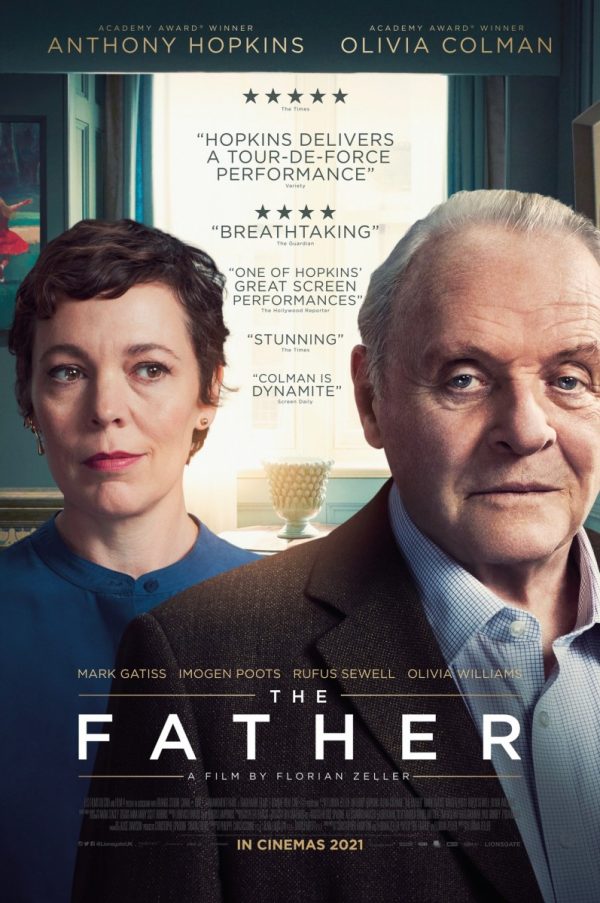The Father, 2020.
Directed by Florian Zeller.
Starring Anthony Hopkins, Olivia Colman, Rufus Sewell, Mark Gatiss and Olivia Williams.

SYNOPSIS:
Anthony (Anthony Hopkins) is living with his daughter Anne (Olivia Colman) and her husband Paul (Rufus Sewell). Their relationship is loving yet sporadically fractious, as the arrival of unfamiliar faces begins to unsettle this delicate domestic arrangement.
There is something disarmingly simplistic about Florian Zeller’s directorial debut. With minimal locations, subtle set changes and an understated performance from Anthony Hopkins The Father begins gently. Audiences are introduced to a domestic arrangement which invites domestic conflict, wrongfoots with simple substitutions and engages through an excellent ensemble cast.
Olivia Colman’s Anne is the less favoured daughter of two who feels a moral obligation to care for her ailing father. That his ailment is not immediately apparent, his vitriol rarely kept in check and its accompanying contempt for her husband Paul blatant fails to help matters. Co-writer and director Florian Zeller deals in nuance throughout, intonation relentlessly and perspective from minute one.
Anthony and his failing mental faculties are rarely mentioned, but the symptoms manifest themselves in an astonishingly straightforward manner. By employing these savagely effective methods the audience is plunged into Anthony’s uncertainty, confusion and fear. Much of the power behind this movie comes from a sense of realisation for actors and audience members alike.

Old age comes to everyone and losing our grasp on reality through a subtle degradation of memory is terrifying. That the debilitating effects of that can be so accurately portrayed on screen, gives The Father an inherent pathos which is only added to by those involved. Playwright Christopher Hampton, who helped Florian Zeller adapt his original stage version, has eradicated any hint of its theatrical origins allowing the themes to take priority.
As much as the plaudits may go to Anthony Hopkins and Olivia Colman, there is no denying the powerful parts played elsewhere. Mark Gatiss has perhaps never applied his particular type of on-screen persona so effectively. Simultaneously calming yet ever so slightly off kilter, he is both out of place and overtly naturalistic within every scene. His words of reassurance only foreshadow the arrival of further disruption. It is a subtle performance which has been carefully considered and more than matches that given by the principal players.
Olivia Williams again offers up kind words, nurturing promises and an air of calm which unintentionally upsets the status quo. Simply reacting within these moments and remaining low key rather than grandstanding requires presence. Devastating moments of insecurity are played through the eyes while gestures remain minimal. Cinematographer Ben Smithard lets his camera linger in doorways, lay in wait behind closed doors and disregard the passage of time. To capture the mental instability of someone through repetitions, either in conversation or movement, yet keep audiences engaged is a rare trick.
Similarly, production designer Peter Francis employs simplistic in camera tricks to disorientate, confuse and confound in equal measure. Sets are manipulated, time becomes an abstract concept and the flat more of a prison with each passing moment. That sense of an unchanging routine being infiltrated by outside forces, is down to the collaboration between a director and production designer working in unison.
To say that The Father is a unique experience fails to fully appreciate what has been achieved. This is a film of immeasurable power which everyone should experience once. It explores the frailties of being human, in a society which increasingly values youth over experience.
The Father arrives in UK theatres from June 11th.
Flickering Myth Rating – Film ★ ★ ★ ★ ★ / Movie ★ ★ ★ ★ ★
Martin Carr













